Hands-on – Andreas Strehler Papillon Sauterelle à Lune Exacte – The Most Precise MoonPhase Wristwatch Ever
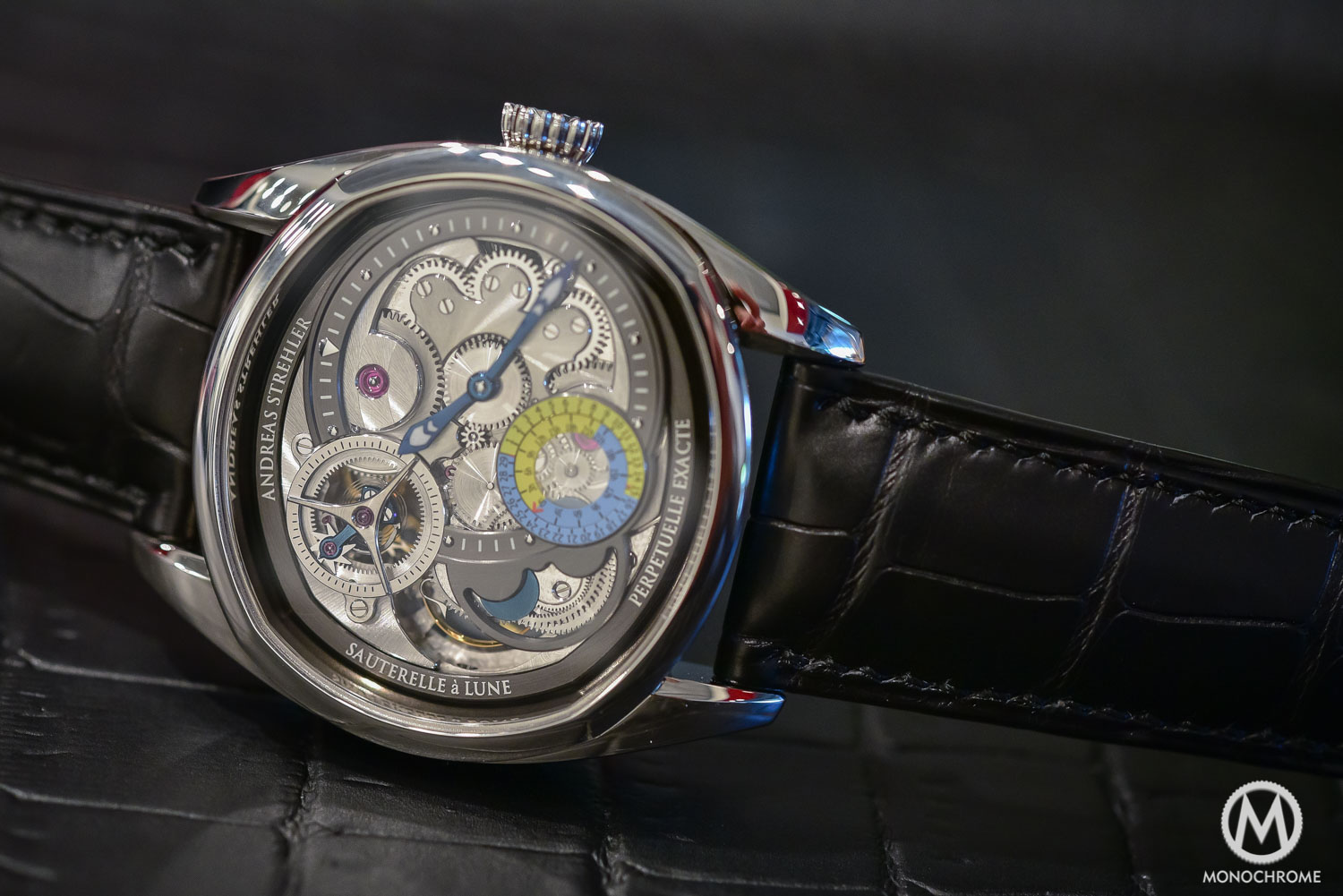
Watchmakers are like all boys. When it comes to numbers, being first or having the greatest is always better – even if having the biggest (watch of course…) is not always desirable. Watchmakers always looked for the most complicated watch, for the watch with the most features, for the most precise movement or for the lightest case. And even when it comes to a specific complication, being the most accurate is a very good marketing argument – which of course always implies stupendous technical developments and immense watchmaking skills. In terms of MoonPhase, the title for the most precise was already in the hands of Andreas Strehler, but it’s now even better with his new Papillon Sauterelle à Lune Exacte.
Technical reminder: the precision of the MoonPhase indication
What is a moon phase indication? Well, as we explained to you in our Technical Perspective article, a moonphase watch tends to reproduce the age of the moon, indicating it via a wheel with 59 teeth (2 x 29.5 days) that advances one tooth per a day, while two Moon faces traditionally appear, one after the other, in a circular window. However, the synodic month, the cycle of visible moon phases, has an average length of 29.530587981 days (29 d 12 h 44 min 2.80 s). Thus, in most watches with a moonphase indication (meaning those that are not really precise), such mechanisms need to be corrected by one day every 2.5 year. That’s the basic version. However, watchmakers always tended to improve this display, making it as precise as possible. Here are some examples:
- The Arnold & Son HM Perpetual Moon – deviation of one day every 122 years (with a very practical extra-feature on the back)
- The Moser Endeavor Moon – deviation of one day every 1,027 years
- The A. Lange & Söhne Richard Lange Terraluna – deviation of one day every 1,058 years
- The Ochs und Junior Moon Phase – deviation of one day every 3478.27 years
- The Christiaan Van Der Klaauw Real Moon Joure – deviation of one day every 11,000 years
The Andreas Strehler Sauterelle à Lune Perpétuelle 2M, the most accurate moonphase indicator in a wristwatch to date – which even entered the Guinness Book of World Records
All of them are extremely impressive. In fact, they are so precise that it is absolutely sure that these watches will be dead, lost, broken, destroyed, sold… (and so on) before you even need to do a single adjustment of the moonphase indication (if you imagine that they run continuously – which is of course not possible, because, at least, you’ll need to service them). Whatever, the point is clearly into the race for the numbers, for THE most precise watch. And at that game, the actual title holder – which is even in the Guinness Book of World Records – is Andreas Strelher, with his Sauterelle à Lune Perpétuelle 2M. Listen clearly: this watch has a moonphase indication that will be accurate (certified number) for the coming 2.060 million years. The concept of a watch will certainly have disappeared at the time you’ll need to do a single adjustment.
Not happy with this record and this out-of-this-world accuracy, Andreas Strehler brings now a new version of his Papillon Sauterelle à Lune, overall as accurate as the other, but with a much more precise display and adjustment of the age of the Moon, intraday.
The Andreas Strelher Papillon Sauterelle à Lune Exacte
With the Papillon Sauterelle à Lune Exacte, Andreas Strehler does not revolutionize its previous concept and technical solutions, which can be found in the Sauterelle à Lune Perpétuelle 2M. His new watch is still overall as accurate, with a deviation of one day per 2.060 million years. The point is not here. What the Papillon Sauterelle à Lune Exacte solves are two well-know issues: the difficulty to easily and accurately adjust a moonphase indication and the precision of the display itself, with something that gives the age of the Moon not to the closest day but with an intraday scale.
Indeed, as precise as they may be, moonphase indicators cannot be read and set very precisely. Due to the absence of scale next to the moonphase in most watches, the wearer has to guess what the exact phase or age of the Moon is (even if some brands, like Arnold & Son, found a solution to that). Thus, the exact setting of the moon phase indication is only possible at new Moon and full Moon. Another issue comes from the legibility of the moonphase itself. Then again, with the absence of scale, you mainly have a suggestion of the age of the Moon and no precise indication, at least not as precise as time telling can be for instance. That’s where the Andreas Strehler Papillon Sauterelle à Lune Exacte rules them all, with one apparently (apparently only) simple thing: a Vernier scale (patented, of course).
The solution to precision and accurate legibility – the Vernier Scale
At 6, the Andreas Strehler Papillon Sauterelle à Lune Exacte is equipped with a new device, which, together with a new design and finishing, makes it different from the Sauterelle à Lune Perpétuelle 2M. This double scale, called a Vernier Scale, shows the age of the moon in days and in hours. Thus, It will be helpful for two reasons: first of all, the Andreas Strehler Papillon Sauterelle à Lune Exacte becomes even more precise in terms of display. Of course, the overall precision remains the same but intrinsically, the watch will provide an even more accurate indication of the age of the Moon, not to the closest day, but to the closest 3 hours.
Then, this vernier scale will make also the adjustment of the moon phase extremely simple and precise. Once you know the exact age of the Moon (something you can easily find on internet…), you just have to adjust, via the crown, the moonphase indication with the help of the Vernier scale, together with the classical moonphase indicator, placed on the left side of the dial and classically displayed in a semi-circular window.
Several stage of the vernier scale
On this high precision moon age scale, a red arrow indicates the age of the moon in days. Two red marks on the scale indicate new moon and full moon. A vernier scale on the inner vernier ring increases the accuracy of the indication to three hours. Its use can be summarize as such:
- The red arrow indicated the age of the moon in days.
- If the arrow points to a number in the blue sector of the outer scale, the accurate value is also read from the blue sector of the inner vernier ring. The age of the moon accurate to three hours is indicated where the next mark on the vernier ring aligns with a mark on the outer ring.
- These hours are added to the days indicated on the outer ring.
-
In the same way, if the red arrow indicates a day on the yellow sector of the outer scale, the hours are also read from the yellow sector on the vernier scale.
On our photos, when we had the opportunity to touch and feel the Andreas Strehler Papillon Sauterelle à Lune Exacte, the age of the moon was thus 24 days and 15 hours (the red arrow points in-between 24 and 25 and the mark that is perfectly aligned is 15 hours). What makes this watch the most precise moonphase indication ever created is this combination of an extremely low deviation with an extremely precise intraday legibility, combined to a superb precision of the setting. Then again, extreme precision in watchmaking sometimes comes from relatively simple solutions… which however requires just a bit of intelligence to be imagined (to say the least). For that, a huge bravo!
A finishing to die for and superb technology
Summarizing the Andreas Strehler Papillon Sauterelle à Lune Exacte to its display of the Moon only would be kind of reductant. Indeed, this watch has much more to offer than its display. Technically, we’re talking about a very complex watch, and even if it “only” displays the hours, the minutes and the age of the Moon, the mechanics behind it are impressive. First of all, this watch features something that you don’t find that often and that is extremely complex: a remontoir d’égalité.
This mechanism – which might sound familiar to F.P. Journe aficionados – tends to deliver a more constant force to the escapement, solving one great issue of watches with a large power reserve. Indeed, the stronger the springs are in a watch, the longer the power reserve will be. But, this also comes with a problem: the stronger a spring is, the more inconsistent the delivery of torque will be. When fully wound, it will deliver a lot of torque. When close to the end of the power reserve, it will deliver low torque. A remontoir will smoothen the delivery of torque by storing energy for one second and delivering it, in equal portions, to the escapement, every second. The watch will thus (theoretically) have the same amplitude during the entire range of the power reserve.
However, Andreas Strehler’s system is a bit different. Usually, the remontoir acts on the escape-wheel. However, this is the point in the whole movement where the least torque is present. For this reason, Andreas Strehler’s remontoir d’égalité is attached to the seconds wheel or fourth wheel. Thus, the complete escapement, including the escapement wheel, oscillates free from any influence between the individual impulses delivered by the remontoir d’égalité. For more detail about constant force, please check our technical guide.
Alongside these technical achievements, there’s the beauty of the execution… and what a finishing. The Andreas Strehler Papillon Sauterelle à Lune Exacte perfectly describes what Haute Horlogerie is. Every single part is manufactured and finished with an extreme care, that goes without saying, by hand. On the dial side, on the close-up below, you can see that all the edges of the parts are chamfered and polished – look for instance the arm of the start-shaped wheel of the remontoir, in blued steel. The bridge that holds the barrels (on the dial side) is featured with several internal and sharp angles, once again something that no machine can achieve. All the gears or the smallest screws are also carrying the same attention.
The back side of the movement is even more demonstrative. Both the execution and the design itself are impressive. The movement relies on one main bridge, with the signature butterfly shape that can be found in most watches by Strehler. It features circular Ge,eva stripes (and not industrial ones…) as well as multiple internal angles. The pinnacle might be the golden wheels, with their curved spokes and their bevels, again done by hand. That is something you don’t see often, even in major high-end brands. Overall, it is a feast.
Conclusion about the Andreas Strehler Papillon Sauterelle à Lune Exacte
All together, this watch perfectly defines what high-end independent watchmaking should be: it has innovation (the Vernier scale solves 2 inherent issues of the moonphase, in terms of adjustment and legibility), it has great mechanical solutions (the remontoir d’égalité), it has a unique design (the shape of the case or the butterfly-shaped bridge on the caseback), it has the real haute-horlogerie finishing and it has the exclusivity. The best comes from the actual easiness of the watch: not too big, not too extreme, not complex to use or understand. This beauty has a price (hefty for sure but deserved): 112,000 Swiss Francs in 18k red gold and 125,000 Swiss Francs in platinum (prices before taxes). More details here.
This watch has even been selected for the GPHG and it will compete in the category “Calendar” against 13 other watches (see them here). It honestly deserves to win something there – even if many of the watches selected also have their chances.
Specifications of the Andreas Strehler Papillon Sauterelle à Lune Exacte
- Case: 41mm x 37mm case, 10mm height – 18k red gold or 950 platinum – Sapphire crystals on both sides – 30m water resistant
- Movement: Calibre Sauterelle Lune Exacte, in-house – hand winding – 78h power reserve – 21,600 vibrations/h – Hours, minutes, remontoir d’égalité, moonphase with Vernier scale
- Strap : hand-made alligator strap with gold or platinum pin-buckle



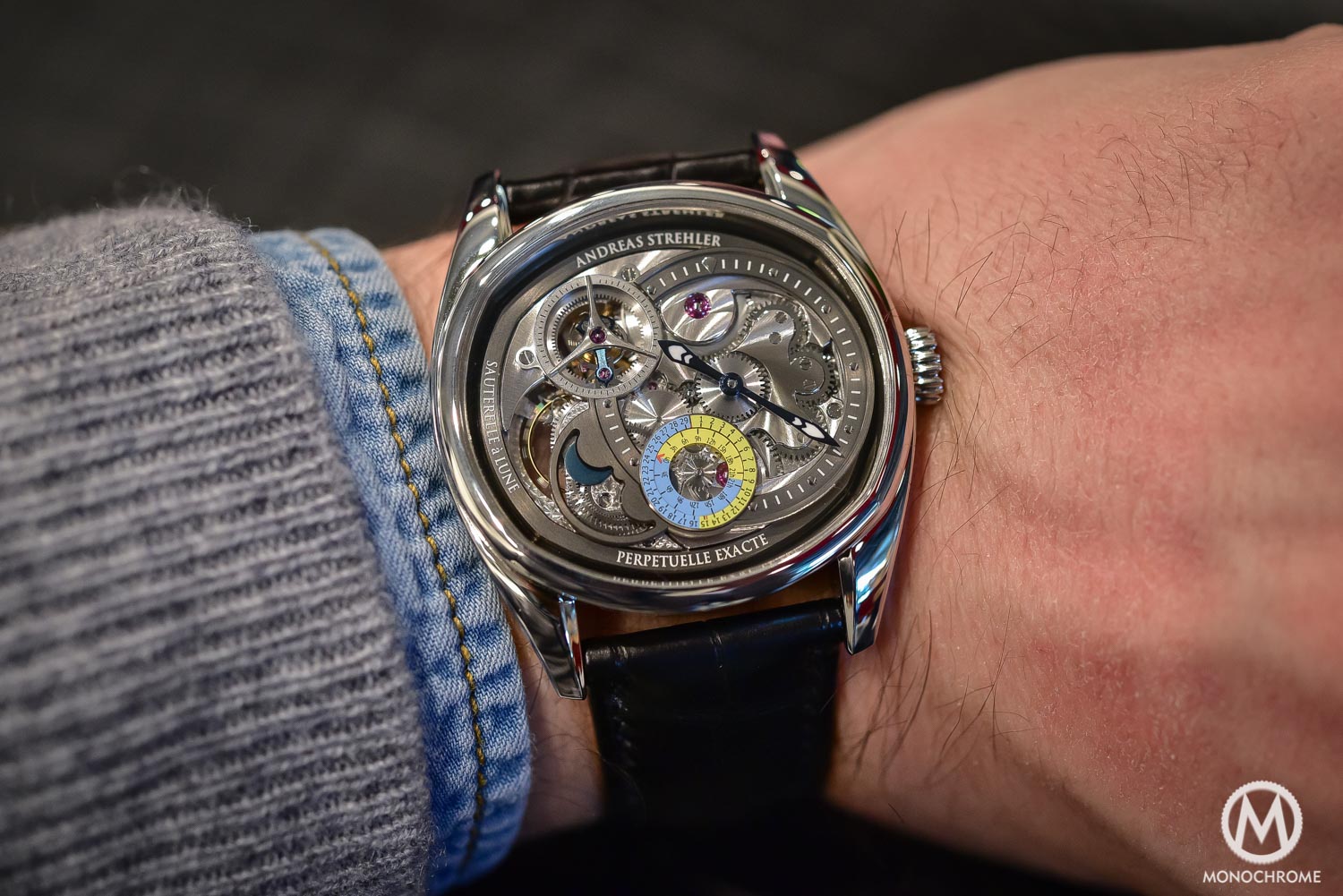
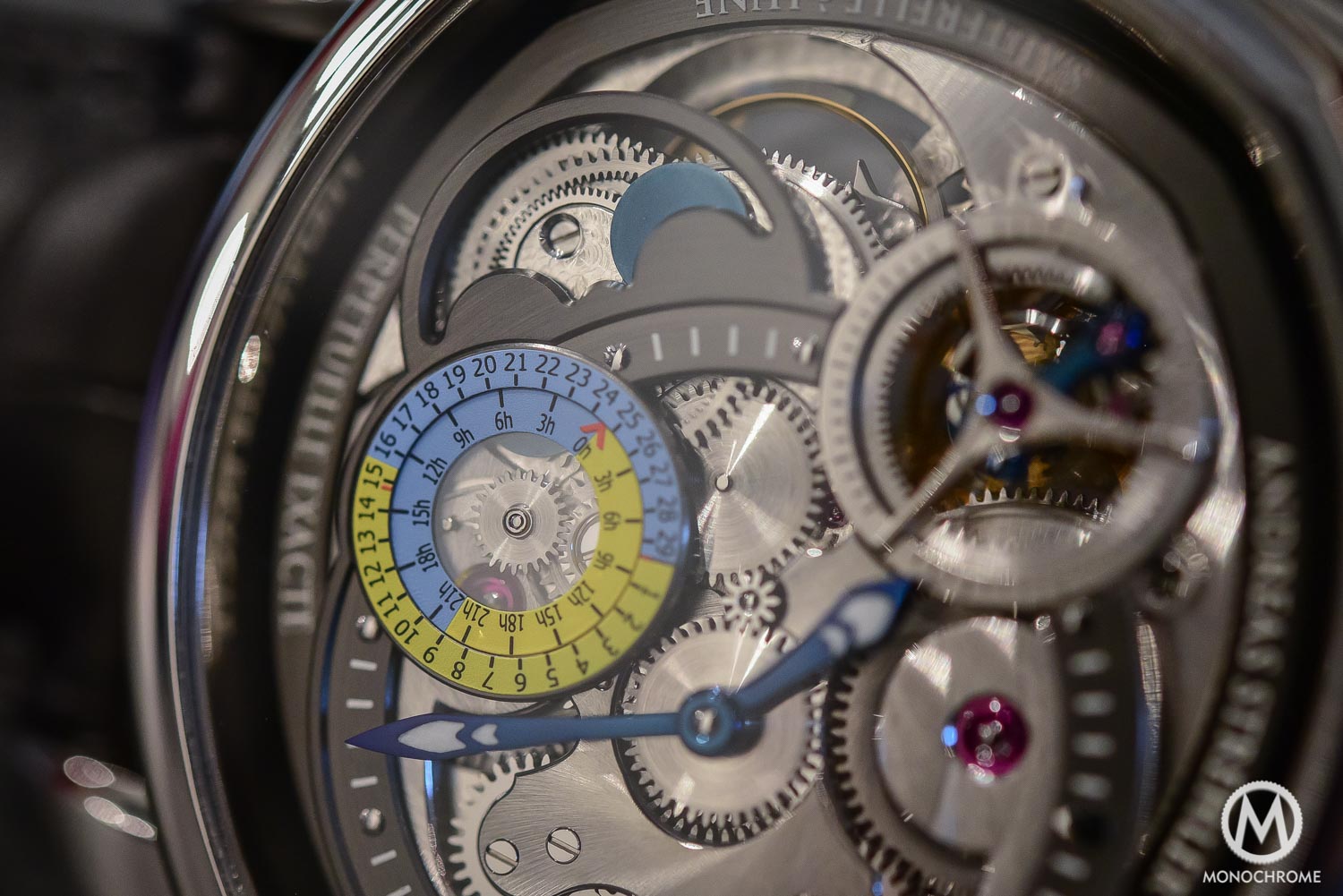
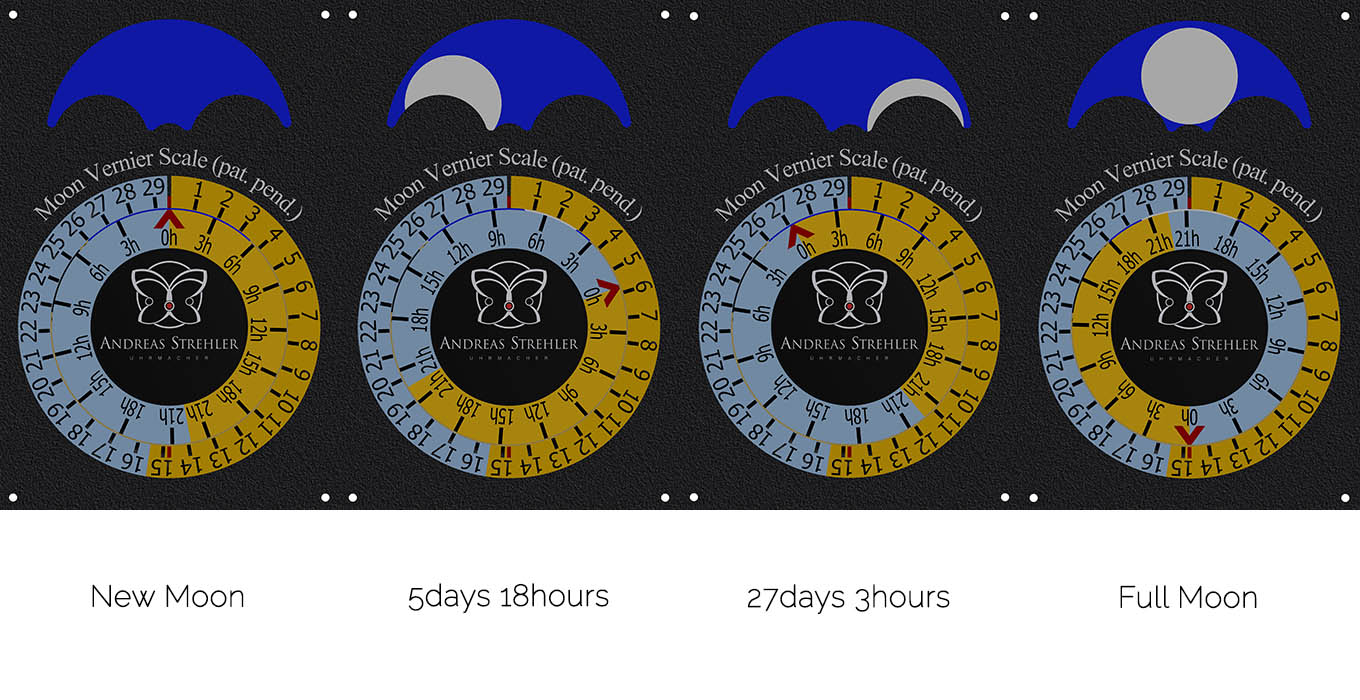
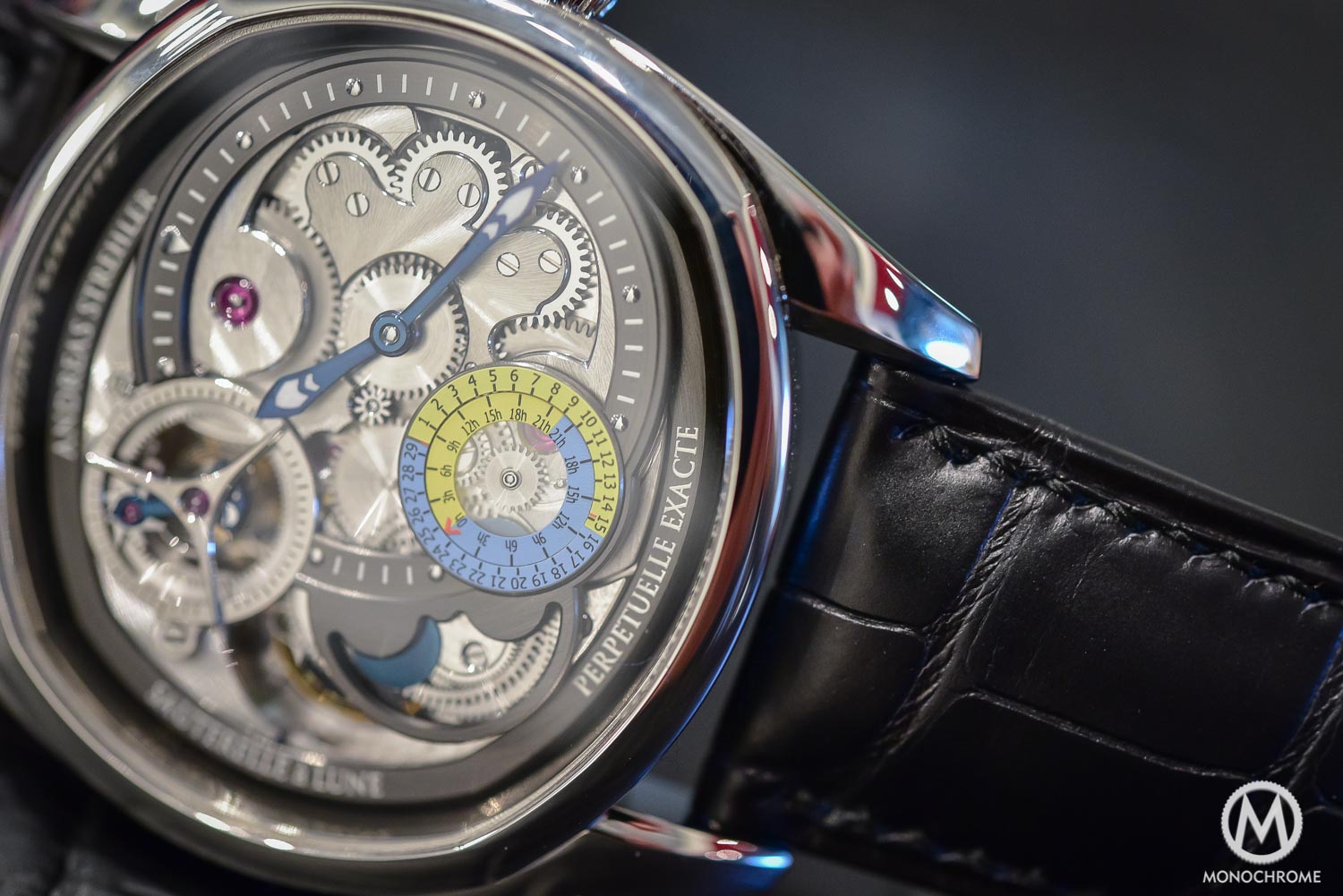
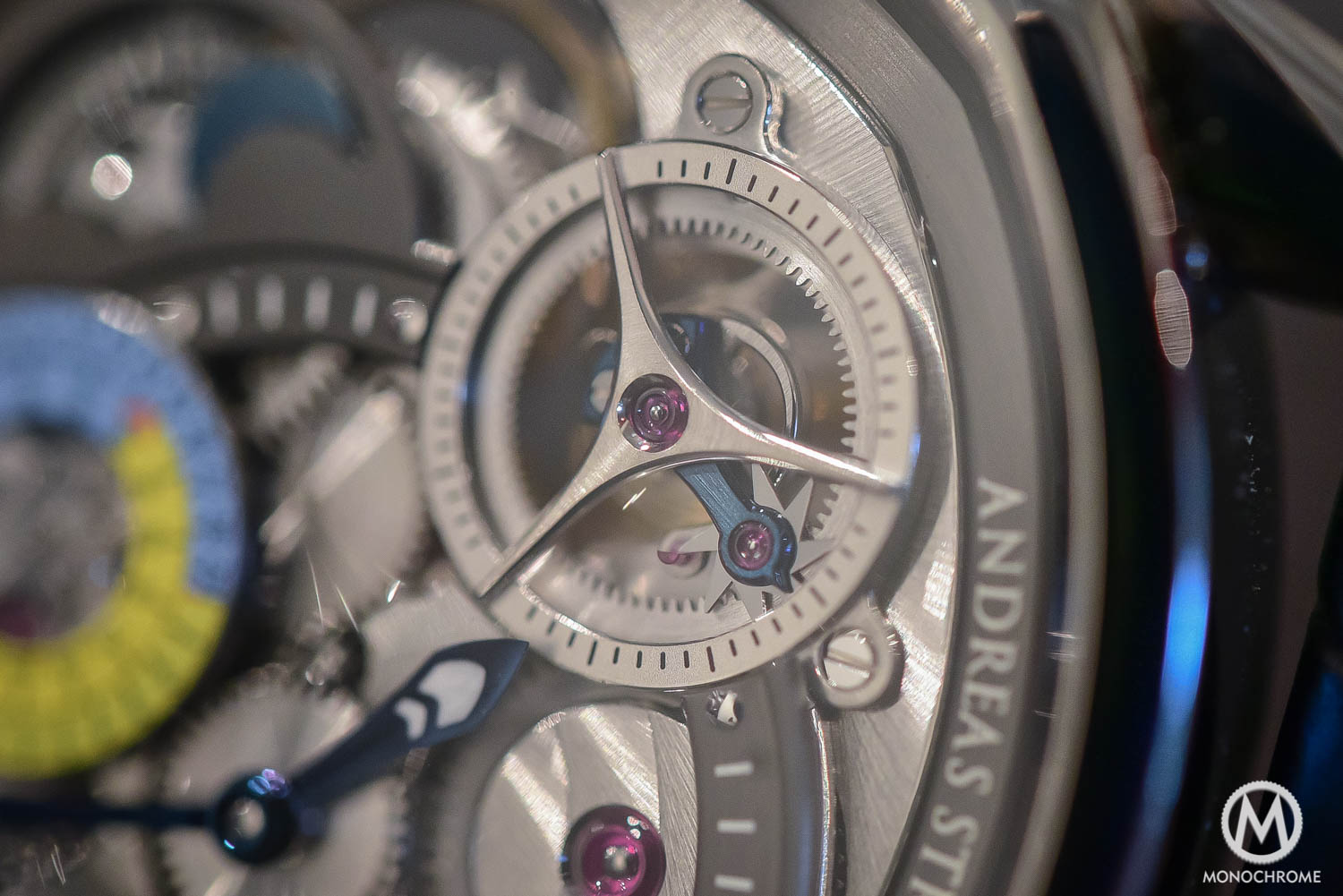
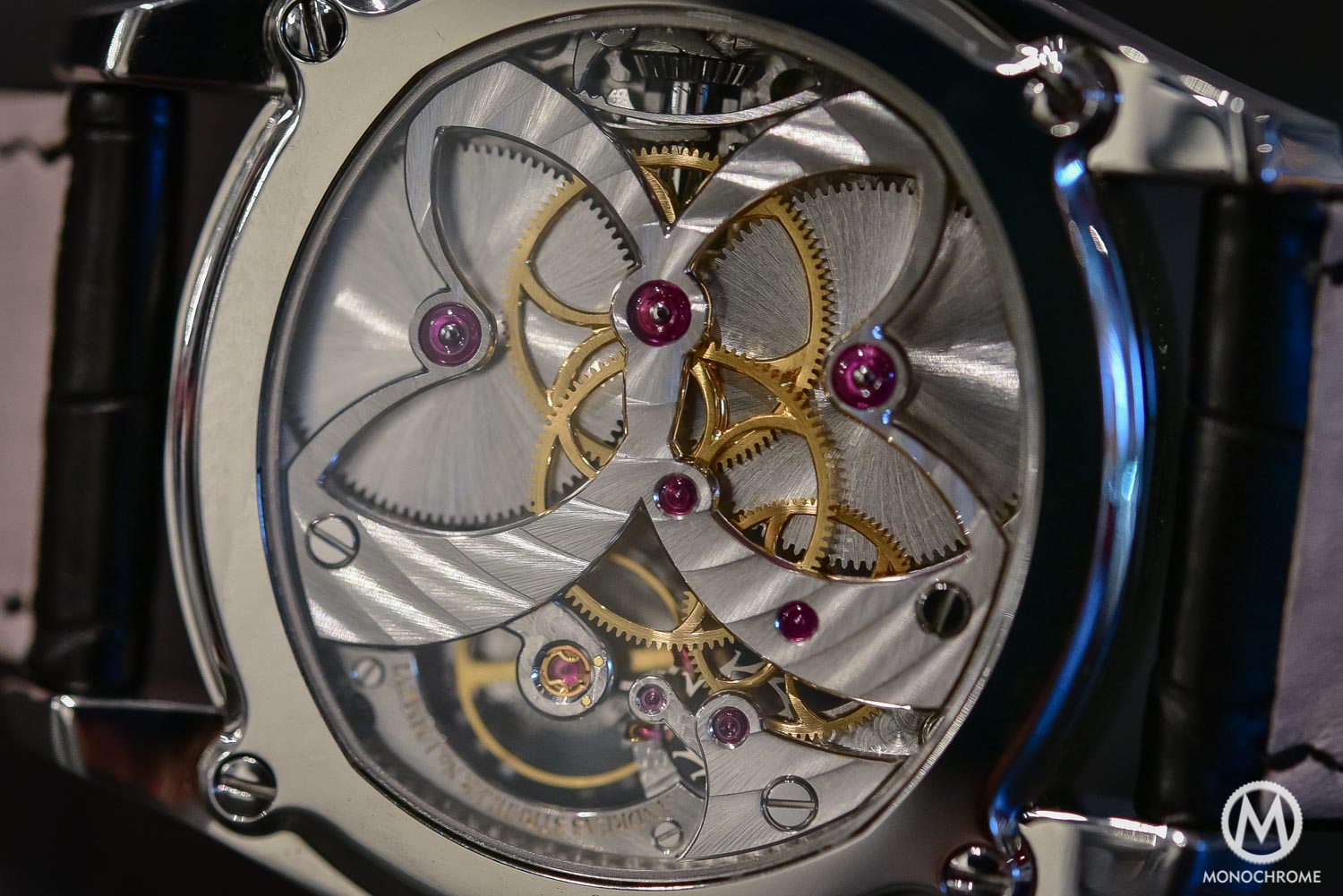
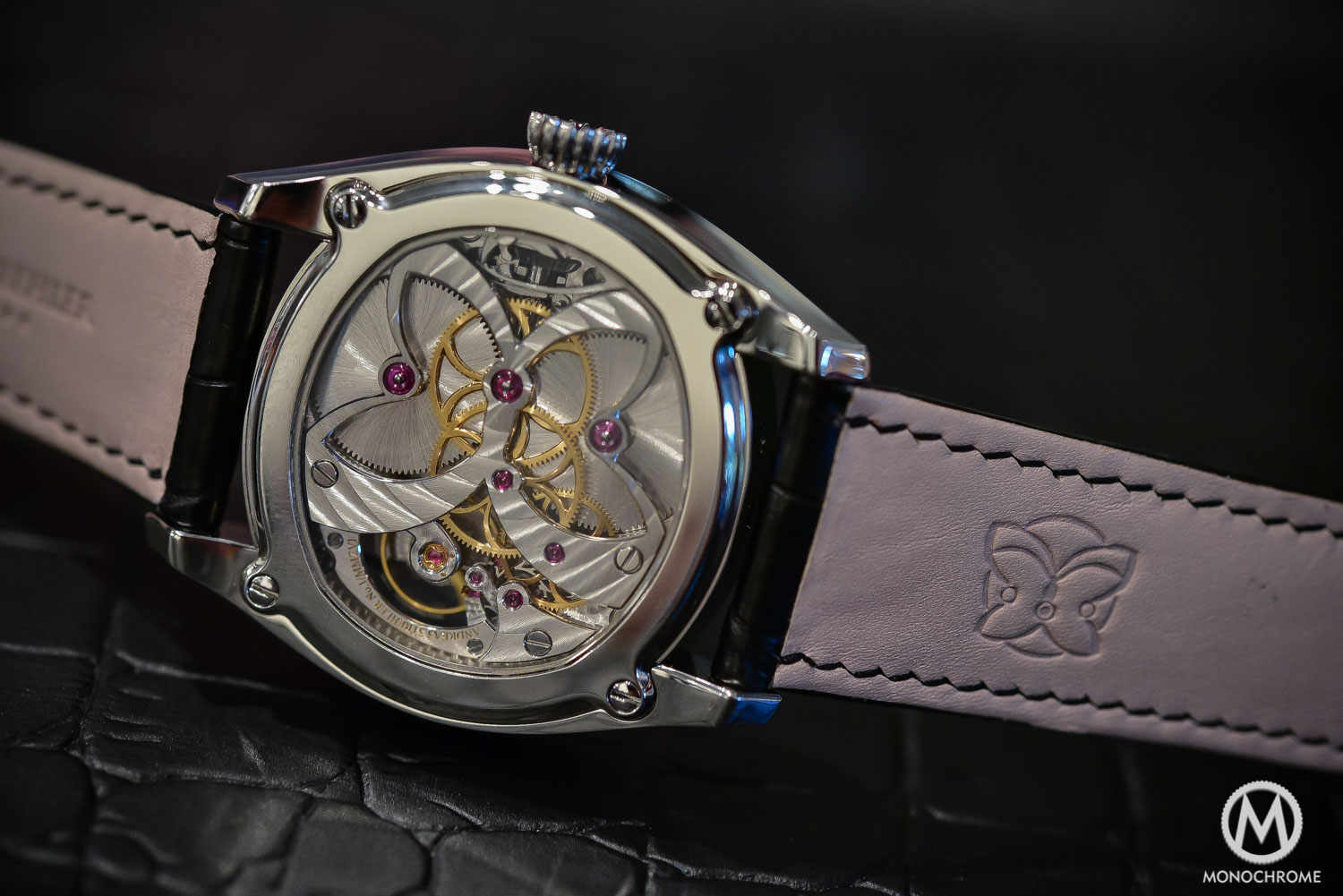
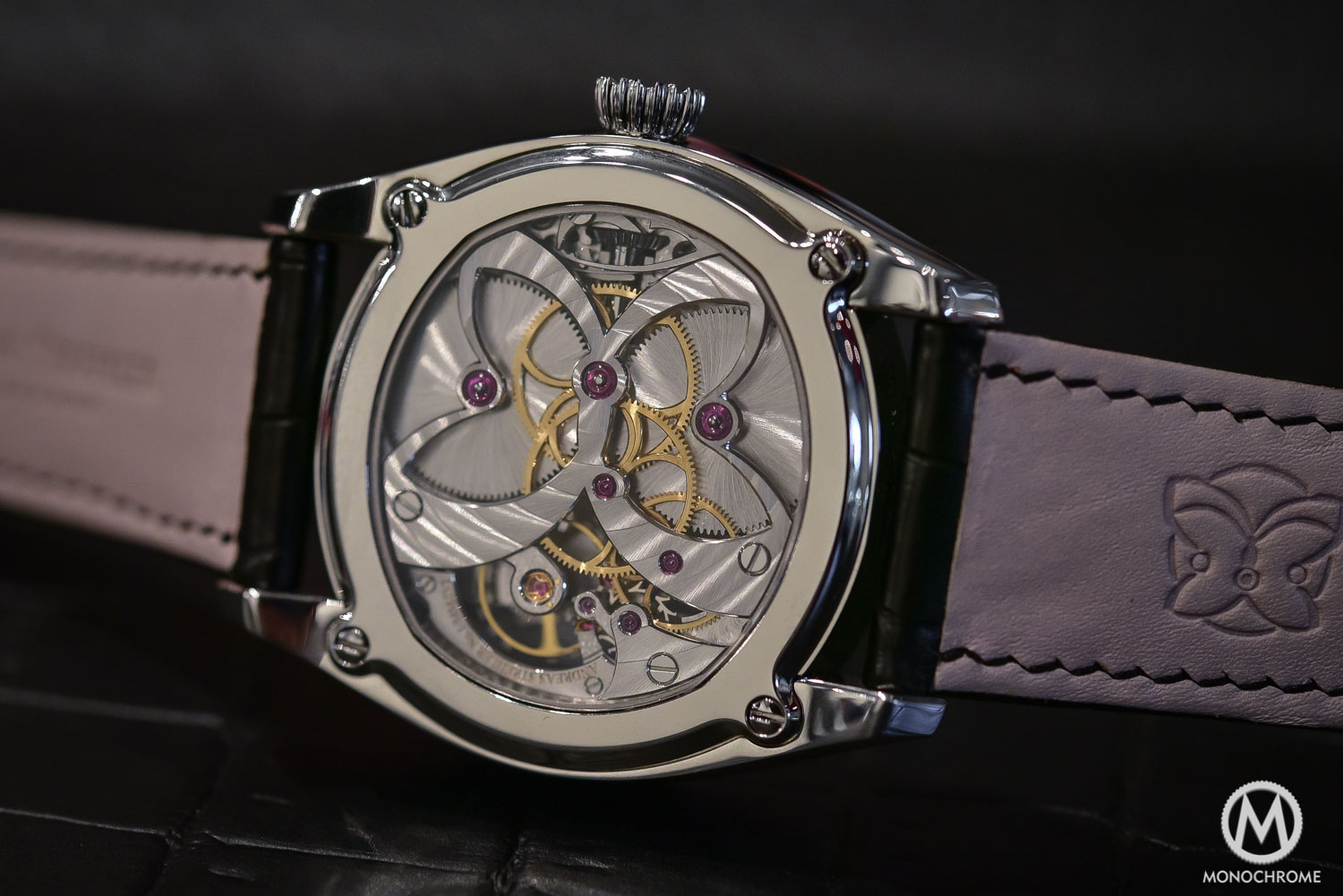

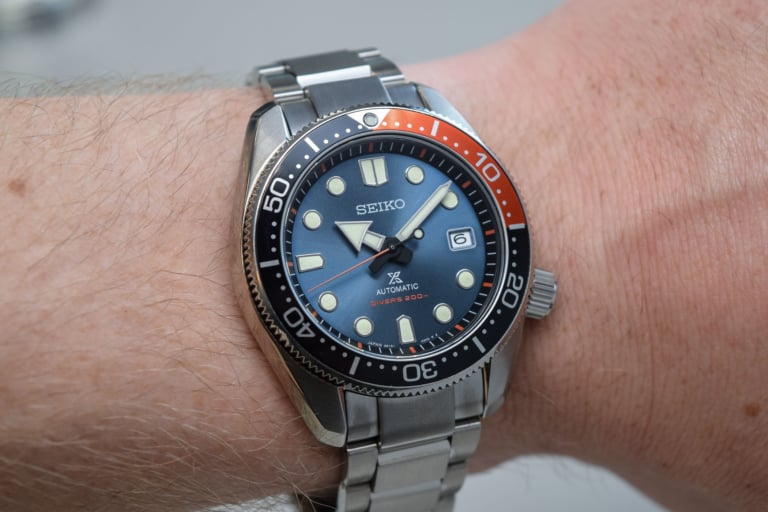
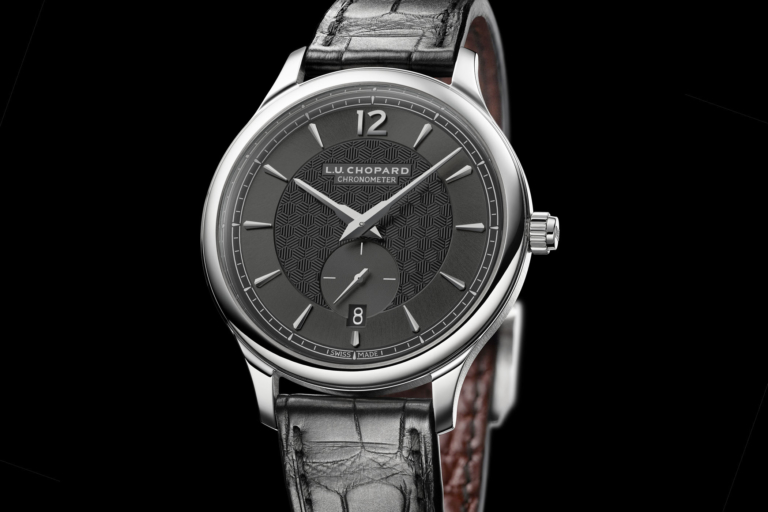
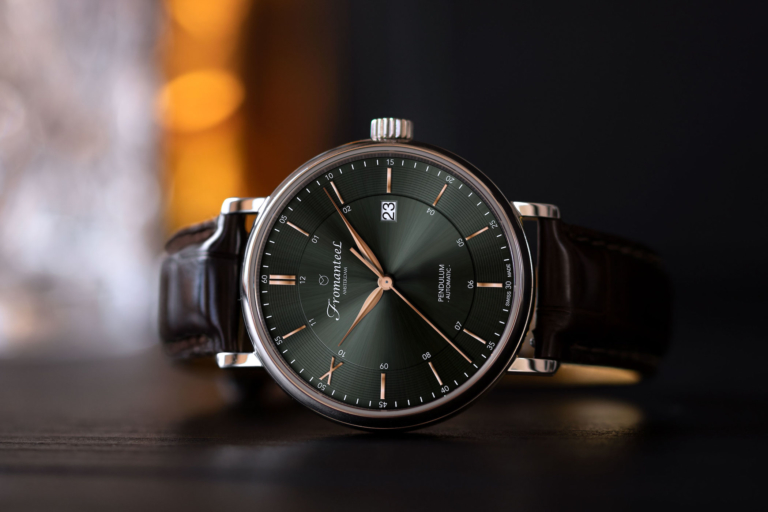
2 responses
Um. Does the 2M years accuracy include the fact that the moon’s orbit increases by 2cm each year? Not much each year but by 2M years…Also as the moon drifts away, our day gets longer as well.
So. Extreme accuracy of the mechanical movement. Celebrate! Respect! etc. An amazing achievement. Accurate to the actual moon over that time? No. But who’ll be around then to complain to their service department?
A bit of mechanical explanation of how the accuracy is achieved is warranted here….we are mostly watch geeks here and since this piece is all about this one complication, lets get a deep look at the way the problem was solved. It looks like a planetary gear train….how does this help?